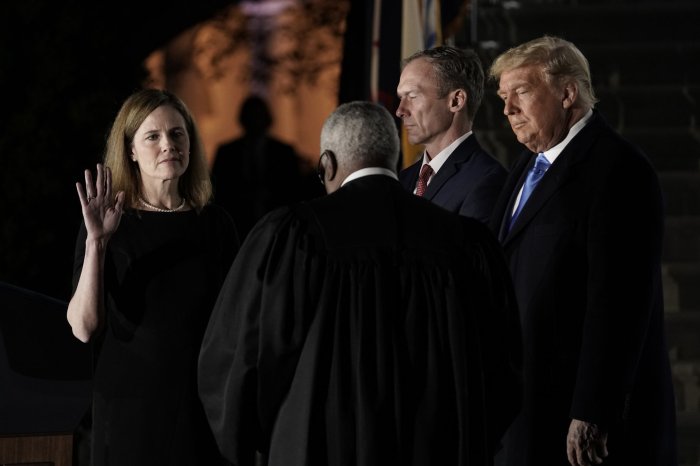Amy Coney Barrett is sworn in as a U.S. Supreme Court justice in a ceremony on the South Lawn of the White House on Monday, October 26, 2020. Photo by Ken Cedeno/UPI |
License Photo
Oct. 22 (UPI) -- About a month after President Donald Trump nominated her for the U.S. Supreme Court, the Senate judiciary committee on Thursday approved Judge Amy Coney Barrett's confirmation and sent it to the full Senate for a final vote.
Her nomination now approved by the committee, it will advance for a full Senate vote, which Republican leader Mitch McConnell said will occur on Monday.
The panel's 12 Republican members voted in favor of Barrett's nomination and all 10 Democratic members boycotted the hearing and did not vote.
Trump nominated Barrett to the high court on Sept. 26 to succeed Justice Ruth Bader Ginsburg, who died a week earlier.
Senate Democratic leader Chuck Schumer tweeted Wednesday that Democrats in the chamber would boycott the "illegitimate markup" of Barrett's nomination and not provide the required quorum. But Republicans had the ability to make a procedural change and approve the appointment.
Schumer also said he would force a vote to adjourn the Senate until after the Nov. 3 election, a move aimed at preventing the chamber from giving Barrett a final vote.
"We are not going to have business as usual here in the Senate while Republicans try to use an illegitimate process to jam through a Supreme Court nominee," he wrote.
Democrats have accused Republicans of hypocrisy after McConnell blocked former President Barack Obama's Supreme Court nominee Merrick Garland in 2016, arguing that no justice should be nominated in a presidential election year.
Republicans have argued that Barrett's nomination is different because they control both the Senate and the presidency.
Before she died, Ginsburg also expressed a wish that her successor be chosen by whoever wins the presidency on Nov. 3.
Barrett, a 48-year-old judge on the 7th Circuit Court of Appeals, last week was grilled by Democrats about her stances on various issues, including the landmark abortion rights case Roe vs. Wade and the Affordable Care Act, as her confirmation would grant conservatives a 6-3 majority on the high court.
Her nomination has also been a regular topic during presidential debates, where Democratic nominee Joe Biden has opposed her confirmation.
"The American people have a right to have a say in who this Supreme Court nominee is and that say occurs when they vote for United States senators and when they vote for president of the United States," Biden said during the first debate in September. "They're not going to get that chance now because we're in the middle of an election already."
At a town hall event in Miami last week, Trump made a different argument, saying "the whole ball game changed" because Democrats staunchly opposed his nomination of Justice Brett Kavanaugh in 2018 over accusations of sexual assault.
Ultimately, Barrett has received overwhelming support from Republicans who are expected to vote for confirmation. Democrats have refused to meet with her on Capitol Hill in recent weeks due to their opposition.
"This is the first time in American history that we have nominated a woman who is unashamedly pro-life and embraces her faith without apology and she's going to the court. A seat at the table is waiting on you," judiciary committee chairman Sen. Lindsey Graham, R-S.C., told Barrett during one of the meetings last week.
Graham has particularly been accused of hypocrisy, after publicly stating twice in 2017 that Republican senators would never favor a Supreme Court nominee if a vacancy came open before the 2020 election. He's in a close battle to keep his Senate seat in a race with Democratic challenger Jaime Harrison.
Female members of Congress stand on the steps of the U.S. Capitol as the flag-draped casket of Justice Ruth Bader Ginsburg is carried by a joint services military honor guard after Ginsburg lied in state at the U.S. Capitol on September 25. Pool Photo by Alex Brandon/UPI |
License Photo
















